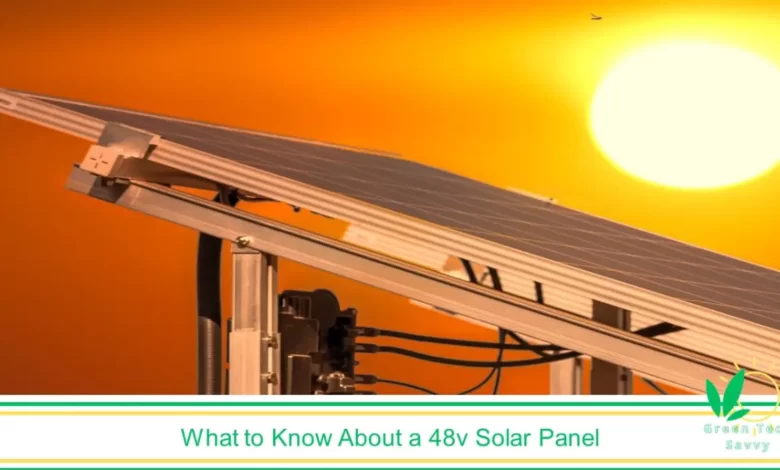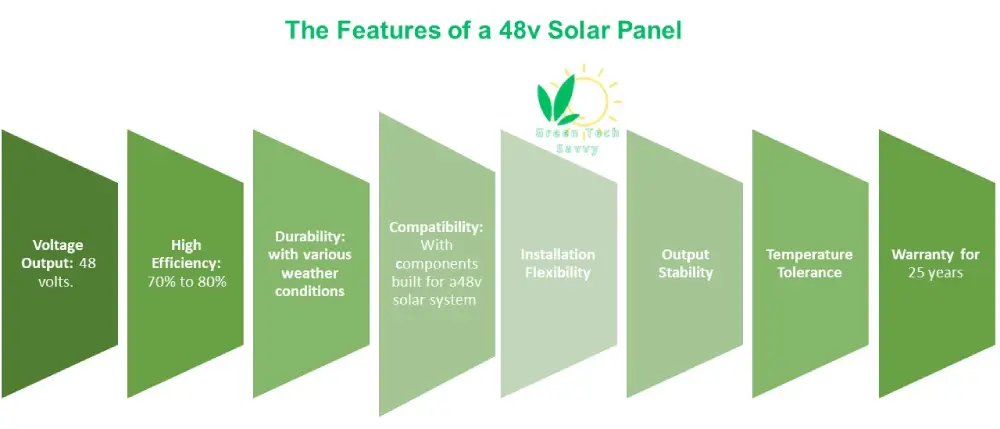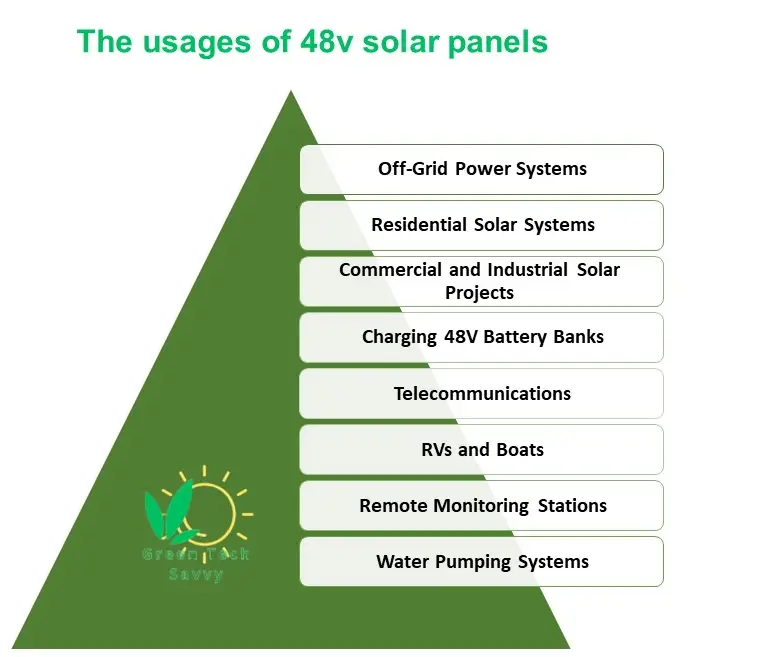48v Solar Panel

What to Know About a 48v Solar Panel?
A 48V solar panel is a solar panel that produces electrical power at or around 48 volts. This voltage is common in solar power systems where panels are connected in series or parallel to achieve a higher overall voltage. A 48V solar panel is found in larger residential, commercial, or industrial solar systems. A 48V solar panel charge a 48V battery bank in off-grid systems.
A 48 volt solar panel is compatible with inverters and batteries designed for a 48v solar system. 48v solar panels generate more energy compared to 12V or 24V panels. This is because the power of a solar panel, measured in watts, is determined by multiplying the voltage by the current. 48 volts panels are rated as the most robust photovoltaic (PV) modules. 48 volts panels have 8 features including (high voltage output, high durability, long warranty).
48v solar panels have 8 main usages including (in home solar systems, in commercial and industrial solar projects, in RVs and boats). The average cost of a 48v solar panel is $362.
Connecting a 48 volt solar system is done in series to boost the voltage, or parallel wiring to boost the amperage. That depends in your home needs and on how many panels do you need to power your home or your commercial project.
This article answers the following questions: What is a 48v Solar Panel? What are The Features of a 48v Solar Panel? What are 48v Solar Panels Usages? What is the price of a 48v solar panel? How to Connect a 48v Solar System? How Many Panels Do You Need?
What is a 48v Solar Panel?
A 48V solar panel is a photovoltaic module that generates electrical energy with a nominal output voltage of 48 volts. These solar panels are used in solar power systems where a higher voltage is required. The 48V designation indicates the standard voltage at which the solar panel operates.
A solar panel voltage is the electric potential difference produced by the photovoltaic cells within the panel when exposed to sunlight. A solar panel volt is a measure of the force that drives the flow of electric current generated by the solar cells.
There are 8 key features of a 48V solar panel include a nominal voltage output of around 48 volts, high-efficiency photovoltaic cells, and durability to withstand various weather conditions.
What are The Features of a 48v Solar Panel?
48v solar panels are designed with specific features to cater to systems requiring this voltage level.
There are 8 key features of a 48v solar panel are in the following picture.

The 8 key features of 48v solar panels are in the following list.
- High Voltage Output. The nominal voltage output is 48 volts. This voltage is crucial for compatibility with 48V battery banks and inverters in off-grid solar systems.
- High Efficiency. A 48v solar panel has an efficiency of 70% to 80%. A 48v Solar Panel has high-efficiency photovoltaic cells to maximize the conversion of sunlight into electricity.
- High Durability. 48v solar panels are exposed to various weather conditions, they are designed to be durable and withstand environmental elements.
- Good Compatibility. 48v solar panels are compatible with charge controllers, inverters, and other components specifically built for a 48v solar system.
- Flexible Installation. A 48v Solar Panel has flexible installation options, such as mounting on rooftops, ground-mounted systems, or integration into larger solar arrays.
- Stable Output. The voltage stability of a 48v Solar Panel output is important for the proper functioning of the associated electrical components in the solar power system.
- High Temperature Tolerance. A 48v solar panel handle temperature variations efficiently.
- Long Warranty. Manufacturers provide warranties for 48v solar panels covering 25 years. This warranty reflects the manufacturer’s confidence in the product’s quality and durability.
What are 48v Solar Panels Usages?
48V solar panels have 8 key usages and applications, including off-grid power systems, residential solar installations, commercial and industrial projects, and other scenarios where a 48V output is necessary for compatibility with associated equipment like inverters and battery banks. The 48v Solar panels’ 8 usages are in the next picture.

The 48v solar panels’ 8 main usages are in the next list.
- In Off-Grid Power Systems. 48v solar panels are employed in off-grid solar power systems.
- In Residential Solar Systems. 48v solar panels are used in larger residential solar systems with higher voltage. 48v solar system help to power a home or supplement energy needs, especially in areas with high electricity costs.
- In Commercial and Industrial Solar Projects. 48v solar panels are suitable for such applications. 48v solar panels provide a large and efficient solution, where commercial or industrial project require higher voltage systems
- In Charging 48V Battery Banks. 48v solar panels charge 48 battery banks, providing a reliable and sustainable power source.
- In Telecommunications. In remote or off-grid areas, 48v solar panels power telecommunications equipment. This is especially useful in locations where it is impractical or expensive to run power lines.
- In RVs and Boats. 48 volt solar panels to generate electricity for appliances, lighting, and other electrical systems on recreational vehicles (RVs) and boats .
- In Remote Monitoring Stations. 48v solar panels are employed in remote monitoring stations, weather stations, or other applications where a self-sustaining power source is needed.
- In Water Pumping Systems. 48v solar panels to generate power for solar-powered water pumping systems.
A 48 Volt Solar Panel’ price is suitable for all the 8 usages.
What is the Price of a 48 Volt Solar Panel?
The price of a 48v solar panel ranges from $175 to $550. The average cost of a 48v solar panel is $362. The overall price of a 48v solar system is significantly influenced by the brand and panels’ number.
How to Connect a 48v Solar System?
A 48v solar system is connected using different methods depending on your specific needs. In parallel wiring, we maintain the voltage of each solar panel while adding up the amperage. It’s a way to boost the overall amperage of a 48v solar power system without altering the voltage. In parallel wiring, a 48 volt solar system retains its voltage at 48 Volts.
Connecting a 48 volt solar system in series results in the summation of the voltage across all panels while maintaining the amperage equivalent to the panel with the lowest amperage.
Series Parallel Connection combines the features of both series and parallel configurations. By employing series-parallel wiring, regulate the voltage and amperage within the solar power system, optimizing its performance. In a 48v solar power system, a series-parallel connection enables adding a charge controller with a lower maximum voltage threshold by increasing the current. In this configuration, solar panels are connected in series and combined in parallel.
Choose between connecting methods after determinism your needs from voltage, amperage and how many panels do you need?
How Many Panels Do You Need?
To determine the number of 48v solar panels needed to power a house, first, analyze past utility bills to establish the average energy consumption of your home. Calculate the required solar panels by multiplying your household’s hourly energy needs by the peak sunlight hours specific to your region. Account for system losses in the calculation, and then divide the result by the wattage of a solar panel. To know how many panels you need for a 48v solar power system, you must determine the household’s average energy consumption.